Papers by Louise M Howard
Journal of family violence, Feb 10, 2024
DVA prevalence rates among women from different ethnic groups (i.e., white, mixed, black or black... more DVA prevalence rates among women from different ethnic groups (i.e., white, mixed, black or black British, Asian or Asian British) (ONS, 2022). However, violence and abuse is less likely to be disclosed to statutory services by ethnic minorities than by white British women (Femi-Ajao, 2018). Women also report experiencing DVA in pregnancy, with prevalence estimates ranging from 3 to 30% (Bacchus et al., 2004;
European journal of public health, Oct 1, 2014
Background Mental illness is associated with increased risk of violence towards others, but the e... more Background Mental illness is associated with increased risk of violence towards others, but the extent to which psychiatric disorders are associated with increased risk of violence to partners is unclear. We aimed to establish risk of intimate partner violence (IPV) among men and women with diagnosed psychiatric disorders, and to examine mental illness and mental health service …

Journal of Reproductive and Infant Psychology, Sep 3, 2020
Mothers' experiences of acute perinatal mental health services in England and Wales: A qualitativ... more Mothers' experiences of acute perinatal mental health services in England and Wales: A qualitative analysis Background/Objective: Perinatal mental health services are a current NHS priority and services are being increased for women. There is limited research on mothers' views of these services and most research focuses on mother and baby units. As part of an investigation into the effectiveness of acute perinatal mental health services in England and Wales, this study explored women's views of their experiences of generic wards, mother and baby units and crisis resolution teams. Methods: A qualitative thematic analysis was conducted on written feedback on a service user designed perinatal mental health questionnaire. 139 women recruited across 42 mental health trusts made written feedback comments. Results: Two key themes were identified: support networks and staff authority. Support networks included subthemes of family involvement; feeling understood by staff/peers, and staff and communication. The theme of staff authority included an overlapping subtheme of staff communication plus subthemes of lack of confidence in staff and service user autonomy. All of the themes contributed to whether mothers felt safe in these services. Mothers reported the benefits of positive, non-coercive relationships with family and staff for their mental health recovery. The findings highlight that the challenges women face in perinatal settings reflect the literature on general psychiatric services, particularly around the use of coercion. Conclusions: There are three specific implications for mothers accessing perinatal mental health services: 1) integrated mental health care and support with babies; 2) support with separation from babies for mothers in acute wards; 3) improvement of women's relationships with social services across all services.
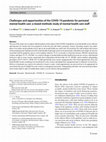
Archives of women's mental health, Apr 8, 2021
The aim of this study was to explore staff perceptions of the impact of the COVID-19 pandemic on ... more The aim of this study was to explore staff perceptions of the impact of the COVID-19 pandemic on mental health service delivery and outcomes for women who were pregnant or in the first year after birth ('perinatal' women). Secondary analysis was undertaken of an online mixed-methods survey open to all mental health care staff in the UK involving 363 staff working with women in the perinatal period. Staff perceived the mental health of perinatal women to be particularly vulnerable to the impact of stressors associated with the pandemic such as social isolation (rated by 79.3% as relevant or extremely relevant; 288/363) and domestic violence and abuse (53.3%; 192/360). As a result of changes to mental health and other health and social care services, staff reported feeling less able to assess women, particularly their relationship with their baby (43.3%; 90/208), and to mobilise safeguarding procedures (29.4%; 62/211). While 42% of staff reported that some women engaged poorly with virtual appointments, they also found flexible remote consulting to be beneficial for some women and helped time management due to reductions in travel time. Delivery of perinatal care needs to be tailored to women's needs; virtual appointments are perceived not to be appropriate for assessments but may be helpful for some women in subsequent interactions. Safeguarding and other risk assessment procedures must remain robust in spite of modifications made to service delivery during pandemics.
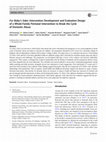
Journal of Family Violence, Jan 25, 2019
For Baby's Sake is an innovative whole-family intervention that works with parents from pregnancy... more For Baby's Sake is an innovative whole-family intervention that works with parents from pregnancy to two years postpartum to break cycles of domestic abuse and improve outcomes for children. The programme launched in 2015 across two community settings in England, with an independent evaluation led by King's College London. This paper aims to (1) summarise the process of developing For Baby's Sake and how it has been embedded within two different settings and (2) describe the evaluation design using early data to illustrate successes and challenges. The programme was developed following a review of the evidence and extensive stakeholder engagement. Three experts co-designed the content in partnership with the Stefanou Foundation and the programme delivery teams have been integrated into two local authorities. The evaluation uses mixed methods to assess abuse victimisation/perpetration, mental health, parenting and child outcomes, alongside service user experiences of early engagement. Forty individuals (27 women and 13 men) have been recruited to the evaluation. Early findings suggest that parents value the novel approach of For Baby's Sake and their relationships with practitioners. Data on parents' mental health and childhood adversities supports the decision to create a traumainformed intervention. Interventions for domestic abuse are necessary to improve health and behaviour outcomes for families and prevent intergenerational transmission of abuse and developmental trauma. For Baby's Sake addresses limitations of existing interventions, through its trauma-informed, attachment-based, whole-family approach. Early data from the evaluation suggests that the programme is reaching its intended audience and that service users appreciate the supportive approach.
Psychological Medicine, Apr 10, 2019
If citing, it is advised that you check and use the publisher's definitive version for pagination... more If citing, it is advised that you check and use the publisher's definitive version for pagination, volume/issue, and date of publication details. And where the final published version is provided on the Research Portal, if citing you are again advised to check the publisher's website for any subsequent corrections.

British Journal of Psychiatry, Jan 11, 2021
Background Investigating obstetric near misses (life-threatening obstetric complications) provide... more Background Investigating obstetric near misses (life-threatening obstetric complications) provides crucial information to prevent maternal mortality and morbidity. Aims To investigate the rate and type of obstetric near misses among women with serious mental illness (SMI). Method We conducted a historical cohort study, using de-identified electronic mental health records linked with maternity data from Hospital Episode Statistics. The English Maternal Morbidity Outcome Indicator was used to identify obstetric near misses at the time of delivery in two cohorts: (1) exposed cohortall women with a live or still birth in 2007-2016, and a history of secondary mental healthcare before delivery in southeast London (n = 13 570); (2) unexposed cohortall women with a live or still birth in 2007-2016, resident within southeast London, with no history of mental healthcare before delivery (n = 223 274). Results The rate of obstetric near misses was 884.3/100 000 (95% CI 733.2-1057.4) maternities in the exposed group compared with 575.1/100 000 (95% CI 544.0-607.4) maternities in the unexposed group (adjusted odds ratio 1.6, 95% CI 1.3-2.0, P < 0.001). Highest risks were for acute renal failure (adjusted odds ratio 2.1, 95% CI 1.1-3.8, P = 0.022); cardiac arrest, failure or infarction (adjusted odds ratio 2.3, 95% CI 1.1-4.8, P = 0.028); and obstetric embolism (adjusted odds ratio 3.1, 95% CI 1.6-5.8, P < 0.001). Conclusions Findings emphasise the importance of integrated physical and mental healthcare before and during pregnancy for women with SMI.
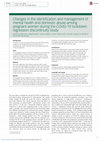
British Journal of Psychiatry Open, Jun 3, 2022
on behalf of the eLIXIR Partnership Background Domestic violence and abuse (DVA) and mental illne... more on behalf of the eLIXIR Partnership Background Domestic violence and abuse (DVA) and mental illness during pregnancy have long-lasting and potentially serious consequences, which may have been exacerbated during the COVID-19 pandemic. Aims To investigate how the UK COVID-19 lockdown policy influenced the identification of DVA and depressive symptoms during pregnancy in health services in SouthEast London in Spring 2020, using eLIXIR (Early-Life Data Cross-Linkage in Research) maternity and mental routine healthcare data. Method We used a regression discontinuity approach, with a quasiexperimental study design, to analyse the effect of the transition into and out of the COVID-19 lockdown on the rates of positive depression screens, DVA recorded in maternity and secondary mental health services, and contact with secondary mental health services during pregnancy. Results We analysed 26 447 pregnancies from 1 October 2018 to 29 August 2020. The rate of DVA recorded in maternity services was low throughout the period (<0.5%). Within secondary mental health services, rates of DVA dropped by 78% (adjusted odds ratio 0.219, P = 0.012) during lockdown, remaining low after lockdown. The rate of women screening positive for depression increased by 40% (adjusted odds ratio 1.40, P = 0.023), but returned to baseline after lockdown lifted. Conclusions Rates of DVA identification in secondary mental health services dropped during and after lockdown, whereas overall rates of DVA identified in maternity services were concerningly low. Healthcare services must adopt guidance to facilitate safe enquiry, particularly in remote consultations. Further research is vital to address the longer-term impact on women's mental health caused by the increase in depression during the lockdown.
International Journal for Quality in Health Care, Sep 1, 2017
Issues in Mental Health Nursing, Jun 30, 2016
This is a protocol for a Cochrane Review (Intervention). The objectives are as follows: To assess... more This is a protocol for a Cochrane Review (Intervention). The objectives are as follows: To assess the effectiveness and safety of antidepressant drugs in comparison with any other treatment (psychological, psychosocial, or pharmacological), placebo, or treatment as usual for PND.

Frontiers in global women's health, Apr 9, 2021
Background: The health benefits of breastfeeding are well-established but for mothers with severe... more Background: The health benefits of breastfeeding are well-established but for mothers with severe mental illness (SMI), the decision to breastfeed can be complex. Very few prior studies have investigated the infant feeding choices of women with SMI, or the factors associated with this. Our aims were to examine antenatal infant feeding intentions and infant feeding outcomes in a cohort of women admitted for acute psychiatric care in the first postpartum year. We also aimed to examine whether demographic and clinical characteristics associated with breastfeeding were similar to those found in previous studies in the general population, including age, employment, education, BMI, mode of delivery, smoking status, and social support. Methods: This study was a mixed-methods secondary analysis of a national cohort study, ESMI-MBU (Examining the effectiveness and cost-effectiveness of perinatal mental health services). Participants had been admitted to acute care with SMI in the first postpartum year. Infant feeding outcomes were retrospectively self-reported by women during a 1-month post-discharge interview. Free-text responses to questions relating to infant feeding and experience of psychiatric services were also explored using thematic analysis. Results: 144 (66.1%) of 218 women reported breastfeeding (mix feeding and exclusive breastfeeding). Eighty five percentage of the cohort had intended to breastfeed and of these, 76.5% did so. Factors associated with breastfeeding included infant feeding intentions, employment and non-Caucasian ethnicity. Although very few women were taking psychotropic medication contraindicated for breastfeeding, over a quarter (n = 57, 26.15%) reported being advised against breastfeeding because of their medication. Women were given this advice by psychiatry practitioners (40% n = 22), maternity practitioners (32.73% n = 18) and postnatal primary care (27.27% n = 15). Most women stopped breastfeeding earlier than they had planned to as a result (81.1% n = 43). Twenty five women provided free text responses, most felt unsupported with infant feeding due to inconsistent information about medication when breastfeeding and that breastfeeding intentions were de-prioritized for mental health care. Conclusion: Women with SMI intend to breastfeed and for the majority, this intention is fulfilled. Contradictory and insufficient advice relating to breastfeeding and psychotropic Baker et al. Infant Feeding and Severe Mental Illness medication indicates that further training is required for professionals caring for women at risk of perinatal SMI about how to manage infant feeding in this population. Further research is required to develop a more in-depth understanding of the unique infant feeding support needs of women with perinatal SMI.
Key issues in mental health, 2013

Purpose: This study aimed to explore how pregnant women who experience Domestic Violence and Abus... more Purpose: This study aimed to explore how pregnant women who experience Domestic Violence and Abuse (DVA) and men who commit DVA understand the impact of their childhood environment on their current parenting practices and how a DVA psychological intervention may shape their parenting. Methods: Repeated individual qualitative interviews were conducted with pregnant mothers and fathers who reported DVA and were taking part in a psychological intervention to address DVA. Interviews were carried out at the start (during pregnancy) and end of the intervention (two years post-childbirth). Reflexive Thematic Analysis was used to analyse interviews. Results: 56 interviews (26 mothers; 13 fathers) were analysed. Five themes were identified: (1) Acknowledging childhood experiences of DVA; (2) The scars of traumatic experiences; (3) Challenging the silencing of abuse; (4) The transmission of parenting styles and behaviours from one generation to another; (5) Becoming the best parent one can be. Ninety-one percent of the participants providing information on their childhood family environment experienced at least one adverse childhood experience (ACE) and the intergenerational transmission of violence was identifiable in most narratives. Despite this, several participants described skills they acquired during the intervention (e.g., emotional regulation strategies) as assisting in interrupting violence and improving their relationships with their children. Conclusions: Participants with at least one ACE identified it as one of several risk factors for DVA in adulthood and how the intergenerational transmission of violence and poor parenting practices may be mitigated through trauma-informed, targeted interventions.
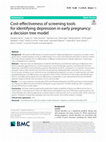
BMC Health Services Research
Background Although the effectiveness of screening tools for detecting depression in pregnancy ha... more Background Although the effectiveness of screening tools for detecting depression in pregnancy has been investigated, there is limited evidence on the cost-effectiveness. This is vital in providing full information to decision makers. This study aimed to explore the cost-effectiveness of different screening tools to identify depression in early pregnancy compared to no screening. Methods A decision tree was developed to model the identification and treatment pathways of depression from the first antenatal appointment to 3-months postpartum using the Whooley questions, the Edinburgh Postnatal Depression Scale (EPDS) and the Whooley questions followed by the EPDS, compared to no screening. The economic evaluation took an NHS and Personal Social Services perspective. Model parameters were taken from a combination of sources including a cross-sectional survey investigating the diagnostic accuracy of screening tools, and other published literature. Cost-effectiveness was assessed in term...
The Lancet Psychiatry
Although IPV is endemic, it is not inevitable: evidence points to several targets for prevention ... more Although IPV is endemic, it is not inevitable: evidence points to several targets for prevention and intervention with individuals, families, communities, and societies. Some are stage-specific, such as parenting programmes to reduce child abuse and neglect, or schools-based programmes to address violence supportive norms and behaviours; others span several stages, or are relevant across the lifecourse, such as the prevention and treatment of substance misuse, and secondary or higher education for women.
A summary of key features from a systematic review protocol registered in PROSPERO International ... more A summary of key features from a systematic review protocol registered in PROSPERO International prospective register of systematic reviews.
Journal of Affective Disorders, 2021
Highlights • Prevalence of lifetime trauma experience in a community birth cohort is 32%.• Mother... more Highlights • Prevalence of lifetime trauma experience in a community birth cohort is 32%.• Mothers with experience of lifetime trauma have higher depressive symptoms.• Antenatal depressive symptoms are a risk factor for self-reported impaired bonding.
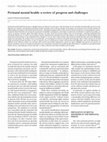
World Psychiatry, 2020
Perinatal mental health has become a significant focus of interest in recent years, with investme... more Perinatal mental health has become a significant focus of interest in recent years, with investment in new specialist mental health services in some high‐income countries, and inpatient psychiatric mother and baby units in diverse settings. In this paper, we summarize and critically examine the epidemiology and impact of perinatal mental disorders, including emerging evidence of an increase of their prevalence in young pregnant women. Perinatal mental disorders are among the commonest morbidities of pregnancy, and make an important contribution to maternal mortality, as well as to adverse neonatal, infant and child outcomes. We then review the current evidence base on interventions, including individual level and public health ones, as well as service delivery models. Randomized controlled trials provide evidence on the effectiveness of psychological and psychosocial interventions at the individual level, though it is not yet clear which women with perinatal mental disorders also ne...
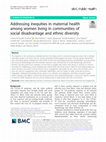
BMC Public Health, 2021
The response to the coronavirus outbreak and how the disease and its societal consequences pose r... more The response to the coronavirus outbreak and how the disease and its societal consequences pose risks to already vulnerable groups such those who are socioeconomically disadvantaged and ethnic minority groups. Researchers and community groups analysed how the COVID-19 crisis has exacerbated persisting vulnerabilities, socio-economic and structural disadvantage and discrimination faced by many communities of social disadvantage and ethnic diversity, and discussed future strategies on how best to engage and involve local groups in research to improve outcomes for childbearing women experiencing mental illness and those living in areas of social disadvantage and ethnic diversity. Discussions centred around: access, engagement and quality of care; racism, discrimination and trust; the need for engagement with community stakeholders; and the impact of wider social and economic inequalities. Addressing biomedical factors alone is not sufficient, and integrative and holistic long-term publ...
Frontiers in Psychiatry, 2020
Assessing the acceptability, feasibility and sustainability of an intervention to increase detect... more Assessing the acceptability, feasibility and sustainability of an intervention to increase detection of domestic violence and abuse in patients suffering from severe mental illness








Uploads
Papers by Louise M Howard